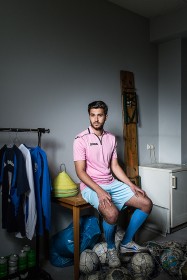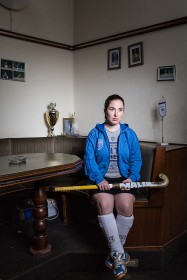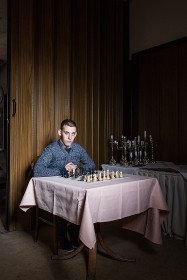The 14th European Maccabi Games (EMG) are taking place in Berlin from 27 July until 5 August 2015. More than 2,000 Jewish athletes from 36 countries will compete in 19 sports from football to fencing to chess. To accompany the games Tamar Lewinsky and Theresia Ziehe are producing a series of portraits with interviews, introducing a new member of the German delegation from Berlin every day here on the blog. They conducted the interviews on the grounds of the TuS Maccabi in Berlin’s Grunewald where Stephan Pramme also shot the portraits.
Tom Meshulam (23), futsal

Tom (23) futsal © Jewish Museum Berlin, photo: Stephan Pramme
Tom, was does it mean to you that the European Maccabi Games are coming for the first time to Berlin?
For me personally, it’s very special. It’s a ‘home game’ because I’m from Berlin. I grew up here and celebrated my bar mitzvah here. Now more than 2,000 athletes will travel here from around the world. It’s going to be a great experience. I think it’s time that, after Vienna and Rome, this event happens in Berlin. One doesn’t always need to put the past in the foreground – it’s important to look forward.
What are the requirements for participation in the EMG?
You have to be good at your sport and make it onto the team. → continue reading
The 14th European Maccabi Games (EMG) are taking place in Berlin from 27 July until 5 August 2015. More than 2,000 Jewish athletes from 36 countries will compete in 19 sports from football to fencing to chess. To accompany the games Tamar Lewinsky and Theresia Ziehe are producing a series of portraits with interviews, introducing a new member of the German delegation from Berlin every day here on the blog. They conducted the interviews on the grounds of the TuS Maccabi in Berlin’s Grunewald where Stephan Pramme also shot the portraits.
Rebecca Kowalski (32), hockey

Rebecca (32) hockey © Jewish Museum Berlin, photo: Stephan Pramme
Rebecca, what’s your feeling about the fact that a part of the European Maccabi Games will take place at Berlin’s Olympic park?
It might be disconcerting for outsiders to learn that we specifically wanted to compete at this place. There were many other possibilities: Berlin has a lot of sports facilities. But from the historical perspective it was important to show that Jewish athletics and Jewish life here in Germany were not obliterated – they’re blossoming anew. From the beginning we had the mentality of ‘Now more than ever.’ We thought, if we hold the EMG here, then we’re going to counter the Third Reich architecture of the Olympic park with our Maccabi Games.
What role does it play for you, to be part of the German delegation? → continue reading
The 14th European Maccabi Games (EMG) are taking place in Berlin from 27 July until 5 August 2015. More than 2,000 Jewish athletes from 36 countries will compete in 19 sports from football to fencing to chess. To accompany the games Tamar Lewinsky and Theresia Ziehe are producing a series of portraits with interviews, introducing a new member of the German delegation from Berlin every day here on the blog. They conducted the interviews on the grounds of the TuS Maccabi in Berlin’s Grunewald where Stephan Pramme also shot the portraits.
Leonid Sawlin, 16, chess

Leonid (16) chess © Jewish Museum Berlin, photo: Stephan Pramme
Leonid, why are you participating in the European Maccabi Games?
The games are really fun. I see friends from other cities, and I’m also learning because there are two grand masters here as coaches. They’re teaching me a lot. And of course I’m proud to get to take part in a European championship.
Jewish athletes were barred from the 1936 Olympics. Does that play a role for you, considering that some of the competitions this year are taking place at Berlin’s Olympic Stadium?
That’s hard to explain. Germany tries to deal with its past but at the same time, it’s not possible to make amends for what happened. → continue reading


